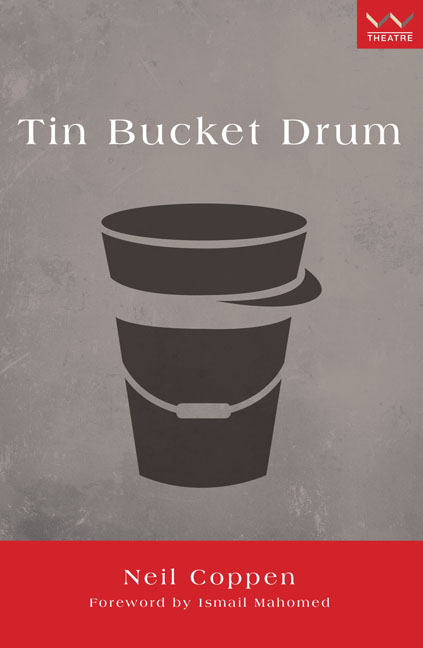Tin Bucket Drum: Questions with Neil Coppen
Published online by Cambridge University Press: 21 April 2018
Summary
Dylan McGarry, educational sociologist and theatre maker, chats to Neil Coppen.
What inspired this story? Where and how was the initialstory seed planted and what was it that compelled you toeventually sit down and write it?
I was in my early twenties and mostly working as an actor at the time. I had become increasingly frustrated with being a passive vehicle for telling other people's stories. At the time, the sorts of plays I was being cast in were mostly English and American ones. I was at a music concert in Durban and a friend of mine, Mike Mazzoni, who headed up a local percussive group called Interittmo Drummers, set me a challenge: to close my eyes during the performance and see if the drumming inspired any ideas for a theatrical collaboration. That night I closed my eyes during the drummers’ performance and in the darkness was visited by the image of a small child marching triumphantly while banging a tin bucket drum. At the time I wasn't entirely sure why she was marching or who she was for that matter, but over the next few months the image and story percolated into what would eventually become one of my first plays: Tin Bucket Drum.
You could say the plays I write stem from a combination of my political curiosities and frustrations. When I look back at the South African zeitgeist at the time of writing: president Jacob Zuma was deeply entrenched in the arms deal debacle, Robert Mugabe was cracking down on neighbouring Zimbabwe, newspapers were full of harrowing stories of communities being bullied by governments to sign away their ancestral land to mining companies and the South African nation, ten years into democracy, seemed to be waking up to the fact that its rainbow ideals were fast disintegrating. All these threads seemed to combine, albeit allegorically, in the writing of the play.
The play is almost constructed like a ballad in itscelebration of the life of a folkloric or mythical heroine.
Exactly. With the original cast and collaborators: Wake Mahlobo (percussionist), Ntando Cele (actress), Karen Logan (director) and myself, we set about composing the story text as one long narrative song (as one would an opera libretto) defined by a series of percussive movements, sounds, rhythmic motifs and refrains.
- Type
- Chapter
- Information
- Tin Bucket Drum , pp. xi - xviPublisher: Wits University PressPrint publication year: 2016



